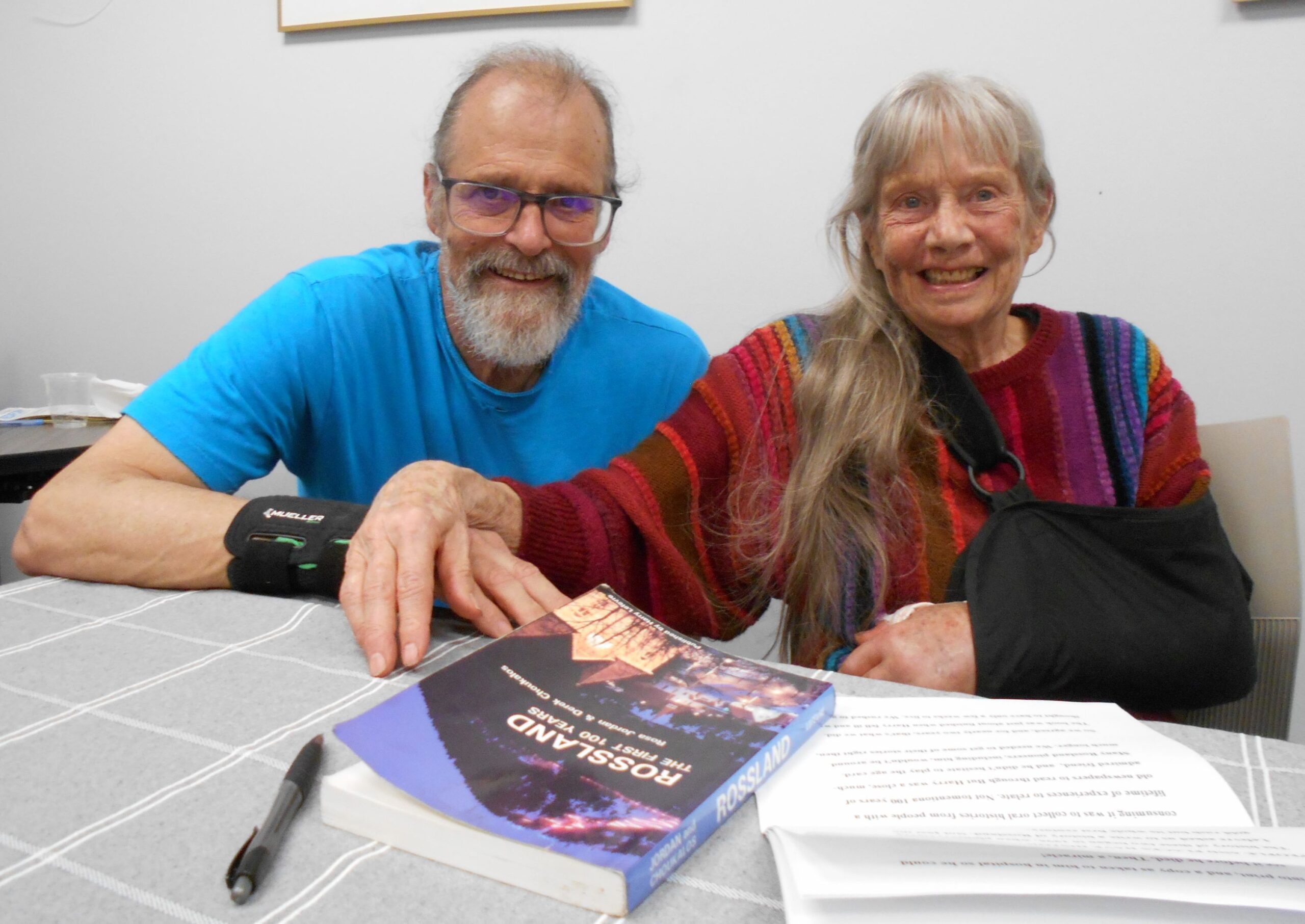Book: Rossland’s First 100 Years – With 21st Century Epilogue
At the Rossland Public Library: Some fascinating details
Rosa Jordan and Derek Choukalos, authors of the original “Rossland: The First 100 Years” provided a reading and brief account of the updated history, titled “Rossland’s First 100 Years – With 21st Century Epilogue.” Jordan explained how the updated history had come to be – and how it had been delayed.
The pictures problem (Corrected with input from the Rossland Museum and Discovery Centre)
Jordan explained the struggle to re-publish their history of Rossland, starting with the fact that many of the original book’s photo illustrations had been provided courtesy of and in partnership with the Rossland Museum, but things had changed since the 1990s, and the Columbia Basin Institute of Regional History had digitized the Museum’s photo collections (an expensive procedure) and would no longer allow their use in the reissued account of Rossland’s past – without payment.
Jordan sought out others with historical photos, and succeeded in pulling together enough illustrations for the updated history, thanks to various other generous souls.
The copyright kafuffle
Jordan then discovered that members of Rossland’s Heritage Commission had registered the Commission as the owner of the book’s copyright. She compared that act with taking your neighbour’s dog, and having a chip implanted in the dog identifying yourself as the dog’s owner, in place of the rightful owner. As authors, she and Choukalos automatically own the copyright – without registering it. So they were taken aback by the notice she received that another entity had registered itself as the owner of the copyright over the book they had written; it took some intervention to reclaim (and register, to be on the safe side) their rightful ownership of the copyright.
The book
Jordan read a few passages from the book, including an account of a student revolt on behalf of a shell-shocked teacher after WWII.
The book is an excellent read; I was given a copy of the original version when we moved to Rossland in 1996 and it gave me a sense of the place that I could not have had otherwise.
Yes, it was written at the behest of a then-prominent Rossland citizen and politician, and published with some financial assistance from him, so it is only natural that it focuses on his virtues and accomplishments, as well as those of his friends and allies, and may gloss over the contributions of others.
The epilogue mentions the loss of the Nancy Greene Recreation Area, which was traded off by government for a protected area elsewhere and re-opened for logging, but fails to mention the Friends of the Rossland Range Society, who worked with Recreation Sites and Trails BC to create the volunteer-managed Rossland Range Recreation Site back in 2014. The site offers some protection for free public recreation in a large swath of land between the Red Mountain commercial tenure and the Big Red Cats commercial tenure that is also utilized by Atco, a local forestry company. The Rec Site, with its several new, more hygienic, and official warming huts – all built and maintained by volunteers — is very well used and appreciated by visitors from around the world as well as locals.
But the book’s epilogue could not possibly capture everything of importance to everyone in Rossland in the past quarter-century plus, without being very much longer. It provides a good summary and captures most of the high points.
My advice to Rosslanders old and new is to get this book—“Rossland’s First 100 Years, with 21st Century Epilogue” and enjoy it to get to know your home town’s history better, and then find other books and other ways to deepen your knowledge of the place.
I’ll make one other book recommendation here: if you can, do acquire “Lost Kootenays” by Eric Brighton and Greg Nesteroff; it’s an excellent and fascinating book about the Kootenay region. It calls itself “a history in pictures” but there is a great deal more to it than that, and it (unlike most other publications) acknowledges the racism that has shaped so much of our current world.
Two good book recommendations — happy reading!


























